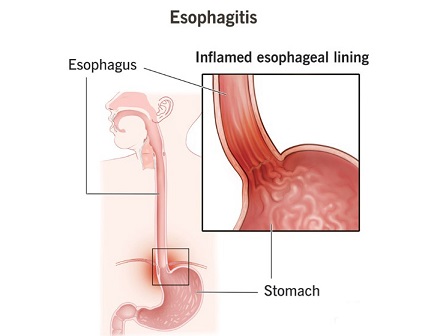Mendelian Randomization Study Reveals COVID-19 Causal Effects On Various Esophageal Diseases
Nikhil Prasad Fact checked by:Thailand Medical News Team May 02, 2024 11 months, 3 weeks, 3 days, 5 hours, 29 minutes ago
COVID-19 News: The COVID-19 pandemic has brought unprecedented challenges, not just in terms of its immediate health impacts but also due to its wide-ranging effects on various organ systems and long-term health outcomes. Among the myriad manifestations of COVID-19, its potential association with esophageal diseases has emerged as an intriguing area of research. Understanding the complex interplay between COVID-19 and esophageal health requires a nuanced approach, combining clinical observations with robust scientific analysis. In this
COVID-19 News report, we delve into the recent Mendelian randomization (MR) study conducted by researchers at The First Affiliated Hospital of Guangxi Medical University in Nanning, China, shedding light on the potential causal links between COVID-19 and a spectrum of esophageal conditions.
 Mendelian Randomization Study Reveals COVID-19 Causal Effects On Various Esophageal Diseases
The Landscape of Esophageal Diseases in the Modern Era
Mendelian Randomization Study Reveals COVID-19 Causal Effects On Various Esophageal Diseases
The Landscape of Esophageal Diseases in the Modern Era
Before delving into the specifics of the MR study, it's crucial to contextualize the rising prevalence of esophageal diseases globally. Factors such as changes in lifestyle habits, including increased smoking rates, alcohol consumption, and dietary patterns, have contributed to a notable uptick in esophageal conditions. From Barrett's esophagus to esophageal cancer and gastroesophageal reflux disease (GERD), these ailments pose significant health challenges and warrant diligent investigation and management strategies. Against this backdrop, the emergence of COVID-19 and its potential impact on esophageal health adds a layer of complexity to the ongoing healthcare landscape.
COVID-19's Multifaceted Clinical Spectrum
SARS-CoV-2, the virus responsible for COVID-19, exhibits genetic variations that contribute to its transmissibility and diverse clinical manifestations. While respiratory symptoms such as cough, fever, and shortness of breath are well-documented, COVID-19's effects extend beyond the lungs. Reports of gastrointestinal symptoms, including diarrhea, abdominal pain, and dysphagia, have underscored the virus's ability to affect the gastrointestinal tract, including the esophagus. Understanding how COVID-19 may influence esophageal health requires a meticulous examination of genetic and clinical data, which the MR study sought to address.
Mendelian Randomization: Unraveling Causality in Complex Systems
Mendelian randomization has emerged as a powerful tool in epidemiological research, particularly in untangling causal relationships in complex biological systems. By leveraging genetic variants as instrumental variables, MR analysis can mitigate confounding factors and provide insights into potential causal associations between exposures and outcomes. In the context of COVID-19 and esophageal diseases, MR offers a structured framework to investigate whether genetic liability to COVID-19 correlates with increased susceptibility to various esophageal conditions.
The MR Study: Methodology a
nd Key Findings
The MR study conducted by researchers utilized data from the COVID-19 Host Genetics Initiative, encompassing diverse genetic information related to COVID-19 severity and outcomes. Additionally, data on ten distinct esophageal diseases were sourced from established databases, providing a comprehensive foundation for analysis.
Key findings from the study include:
-Protective Effect Against Esophageal Obstruction: Genetic liability in confirmed COVID-19 patients showed an association with a reduced risk of esophageal obstruction, hinting at a potential protective mechanism.
-Potential Impact on Benign Esophageal Tumors: The study identified suggestive evidence of a reduced risk of benign esophageal tumors in individuals with genetic susceptibility to COVID-19, highlighting an intriguing aspect of the virus's influence.
-Increased Risk of Congenital Esophageal Malformations: Genetic liability for COVID-19 was linked to a heightened risk of congenital esophageal malformations, suggesting a potential causal relationship that warrants further investigation.
-
Esophagitis Risk in Hospitalized COVID-19 Patients: Hospitalized COVID-19 patients exhibited a suggestive causal association between genetic liabilities and an increased risk of esophagitis compared to non-hospitalized individuals, underscoring the potential impact of COVID-19 severity on esophageal health outcomes.
Discussion: Mechanistic Insights and Clinical Implications
The study's findings prompt a deeper exploration of the underlying mechanisms linking COVID-19 to esophageal diseases. Hypotheses around inflammatory responses, immune dysregulation, and genetic predispositions merit rigorous investigation to elucidate the intricate pathways through which COVID-19 may influence esophageal health. From a clinical standpoint, understanding these mechanisms could inform targeted interventions and personalized management strategies for COVID-19 patients at risk of esophageal complications.
Challenges and Future Directions
While the MR study provides valuable insights, several challenges and avenues for future research emerge. Addressing limitations in data availability, including diverse population cohorts, could enhance the generalizability of findings. Moreover, integrating clinical parameters and long-term follow-up data would enrich our understanding of COVID-19's lasting impacts on esophageal health. Collaborative efforts across disciplines, including genetics, gastroenterology, and infectious diseases, are essential to unraveling the full extent of COVID-19's influence on the gastrointestinal system.
Conclusion: Navigating Complexity for Enhanced Patient Care
In conclusion, the MR study represents a significant step towards unraveling the complex relationship between COVID-19 and esophageal diseases. By leveraging genetic data and robust analytical frameworks, researchers have uncovered intriguing associations that warrant further investigation and clinical consideration. As we navigate the evolving landscape of COVID-19 and its implications for organ-specific health outcomes, continued research efforts, interdisciplinary collaboration, and a patient-centric approach will be pivotal in enhancing care delivery and mitigating long-term health risks associated with COVID-19.
The study findings were published in the peer reviewed journal: Frontiers in Medicine.
https://www.frontiersin.org/articles/10.3389/fmed.2024.1346888/full
For the latest
COVID-19 News, keep on logging to Thailand Medical News.
